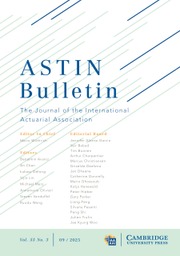Article contents
A Non Symmetrical Value for Games without Transferable Utilities; Application to Reinsurance*
Published online by Cambridge University Press: 29 August 2014
Abstract
We define axiomatically a concept of value for games without transferable utilities, without introducing the usual symmetry axiom. The model—a generalization of a previous paper [6] extending Nash's bargaining problem—attempts to take into account the affinities between the players, defined by an a priori set of “distances”. The general solution of all three- and four-person games is described, and various examples are discussed, like the classical “Me and my Aunt” and a reinsurance model.
Nous définissons de manière axiomatique un concept de valeur pour les jeux à utilités non-transférables, sans introduire l'axiome classique de symétrie. Le modèle — une généralisation d'un concept de valeur [6] étendant à plusieurs joueurs le problème de marchandage de Nash — tient compte des affinités entre les joueurs, données sous forme d'une matrice de “distances” a priori. Nous donnons la solution générale de tous les jeux à trois et quatre joueurs, et discutons plusieurs exemples classiques, dont le célèbre “Ma tante et moi” et le modèle de réassurance de Borch.
- Type
- Research Article
- Information
- Copyright
- Copyright © International Actuarial Association 1979
Footnotes
Presented at the 14th ASTIN Colloquium, Taormina, October 1978.
References
REFERENCES
- 10
- Cited by


